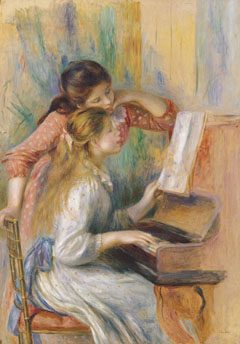 My edition of Arnold Schönberg’s Sechs kleine Klavierstücke op. 19 features an odd choice for a cover image – Renoir’s Young Girls at the Piano. And I find it odd not just because it’s anachronistic, having been painted 20 or so years before Schönberg composed the op. 19, but because of the attitude and expressions of the young girls. You can almost imagine that the pre-serialist atonal work has been transported back two decades, and these ingenues were expecting something charming from someone like that young impressionist upstart Debussy, and while they’re willing to give it a good old drawingroom try, things just aren’t going the way they’d expected. “That can’t be right, Yvette,” the older one seems to say. “But that’s what he’s written, Brigitte! A flat! C’est vrai!”
My edition of Arnold Schönberg’s Sechs kleine Klavierstücke op. 19 features an odd choice for a cover image – Renoir’s Young Girls at the Piano. And I find it odd not just because it’s anachronistic, having been painted 20 or so years before Schönberg composed the op. 19, but because of the attitude and expressions of the young girls. You can almost imagine that the pre-serialist atonal work has been transported back two decades, and these ingenues were expecting something charming from someone like that young impressionist upstart Debussy, and while they’re willing to give it a good old drawingroom try, things just aren’t going the way they’d expected. “That can’t be right, Yvette,” the older one seems to say. “But that’s what he’s written, Brigitte! A flat! C’est vrai!”


I think it’s interesting that before such things as phonographs or radios or iPods, if you wanted to hear a piece of music you went and bought the sheet music and you played it at home on your piano.
YOU played it. Maybe you couldn’t play it like Liszt or Chopin but you could still play it. Besides, you probably never heard Liszt or Chopin playing it because you didn’t have access to those salons (if you even lived in Paris). So you played for the sake of hearing the music.
I’m not one to get all misty and elegiac about the good old days but I do wonder about the gradual ebbing away of the ‘amateur’ musician. It seems to me that with the populist spread of the idea of the virtuoso (thanks, in part, to technology) we study music with an emphasis on being a performer rather than an appreciator or a listener.
I know I certainly wasn’t studying piano for the sake of enjoying how to play it. Or to play the latest popular hits for the enjoyment of my family or friends. But why would I? When the piano versions of the popular music I listened to (back when I was studying piano) sounded like crap. (You can make whatever comments you like about the quality of Duran Duran generally speaking but I think we could all agree that the keyboard version of “Rio” doesn’t inspire head bopping.)
I suppose then I could have been playing my Royal Conservatory pieces for the sake of hearing simplified Bach or Debussy or Czerny (ha, kiddding) but, again, why would I when I could go to my record player or boom box and listen to any one of a dozen virtuosos playing excellent interpretations of a particular piece?
As I said, I’m not bemoaning the advent of technology. Yay technology, I say. But don’t you wonder if learning to play classical (or, as some people like to define it: ‘compositional’) music on the piano (in particular) is going the direction of vaudeville — a charming anachronism that provides us with a window into the past, much like a painting of two young girls sitting at a piano?